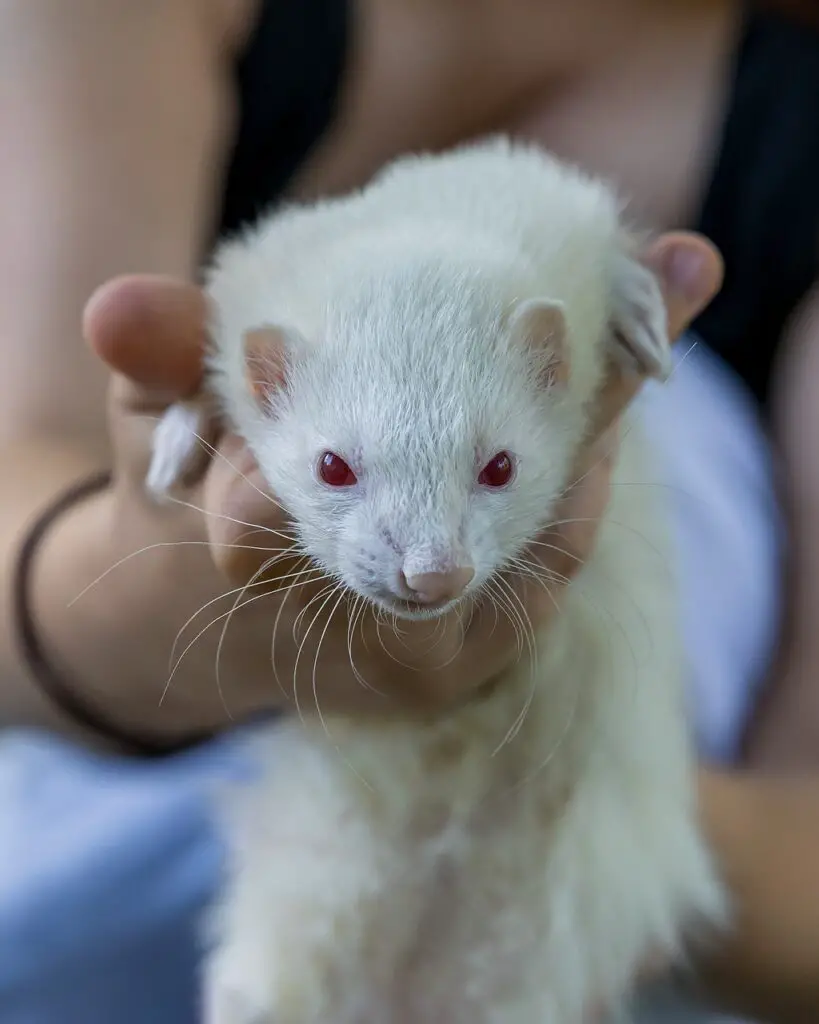Pet ferrets have gained popularity as adorable and playful companions, but one common concern potential owners have is biting.
Do Pet Ferrets Bite? In this article, we will explore ferret behavior and understand the reasons behind biting. We’ll also discuss how to manage and prevent biting to foster a safe and enjoyable relationship with your furry friend.
You may also want to read about the lifespan of a ferret.
Understanding Ferret Behavior
Ferrets are highly social animals with curious and inquisitive natures. Understanding their instincts and behaviors is essential in addressing biting tendencies.

Do Pet Ferrets Bite?
While ferrets are generally friendly, their individual temperaments can vary. Some ferrets may be more prone to biting due to various factors, such as their background and early experiences.
Early Socialization and Training
Proper socialization during a ferret’s early stages is crucial in shaping their behavior. Positive reinforcement training can help discourage biting and encourage positive interactions.
Handling and Interacting with Ferrets
Learning to handle and interact with ferrets properly is key to minimizing the risk of bites. Building trust and bonding with your ferret enhances your relationship.
Identifying Warning Signs
Recognizing warning signs of aggression or fear in ferrets can help prevent bites and improve their comfort during interactions.

Ferret Biting vs. Playful Nipping
Understanding the difference between aggressive biting and playful nipping is vital in managing their behavior. Redirecting playful behavior can be effective.
Addressing Biting Issues
Addressing biting issues requires patience and consistency. Avoid punishing your ferret and instead opt for corrective measures that encourage positive behavior.
Health-Related Biting
Ferrets may bite if they are in pain or feeling unwell. Regular health checkups and preventive measures are essential in keeping your ferret healthy and happy. Also make sure to provide good food.
Child Safety and Ferrets
If you have children, it is crucial to educate them about ferret handling and supervise interactions to ensure safety for both the child and the ferret.
Biting and Ferret Maturity
As ferrets mature, their behavior may change. Managing their behavior throughout their life is essential for a harmonious relationship.
Conclusion
Do Pet Ferrets Bite? Ferrets can make delightful and affectionate pets, but occasional biting behavior is part of their natural instincts. By understanding their behavior, providing appropriate training, and building trust, you can create a rewarding bond with your pet ferret while minimizing the risk of biting incidents.
FAQs About Pet Ferret Biting
- Are ferrets naturally aggressive and prone to biting? No, ferrets are not naturally aggressive animals. However, like all pets, they have instincts and behaviors that may lead to biting if not properly managed or trained. With proper socialization and positive reinforcement training, ferrets can be gentle and friendly companions.
- Is biting common in pet ferrets? Biting can occur in pet ferrets, but it is not a common behavior exhibited by all ferrets. The frequency of biting varies depending on individual temperament, early experiences, and how well they have been trained and socialized.
- Why do ferrets bite? Ferrets may bite for various reasons, including fear, territorial instincts, playfulness, feeling threatened, or pain due to illness or injury. Identifying the trigger for biting is essential in addressing the behavior effectively.
- Can ferret biting be prevented through training? Yes, training plays a crucial role in preventing and addressing biting behavior in ferrets. Positive reinforcement training, early socialization, and teaching bite inhibition are effective methods to discourage biting.
- What should I do if my ferret bites me? If your ferret bites you, it’s important not to react aggressively or punish them. Instead, stay calm and gently disengage from the situation. Avoid reinforcing biting behavior by not reacting negatively. Redirect their attention to a toy or treat as a positive distraction.
- Are there specific warning signs before a ferret bites? Yes, ferrets usually display warning signs before they bite. These may include hissing, arching their back, baring teeth, or displaying aggressive body language. Recognizing these signs can help you avoid potential biting incidents.
- Can health issues cause ferrets to bite? Yes, ferrets may bite if they are in pain, feeling unwell, or experiencing discomfort. Regular health checkups are essential for detecting and addressing health-related issues that could contribute to biting behavior.
- Are ferrets safe pets for families with children? Ferrets can make enjoyable pets for families with children, but it’s essential to supervise interactions between children and ferrets. Educate children about proper ferret handling, including how to approach and interact with them gently.
- Can ferret biting be a sign of aggression? Biting in ferrets can sometimes be a sign of aggression, fear, or territorial behavior. Understanding the context and triggers for the biting incident is essential in determining its root cause.
- Are there any specific toys or treats that can discourage biting behavior? Providing appropriate toys and treats for ferrets can help prevent boredom and reduce the likelihood of biting. Interactive toys, chew toys, and treats designed for ferrets can be beneficial in redirecting their behavior.
Remember, every ferret is unique, and their behavior may vary. Patience, consistency, and positive reinforcement are key to building a trusting and harmonious relationship with your pet ferret while minimizing biting incidents.
